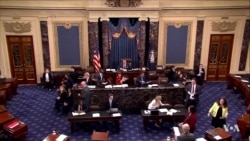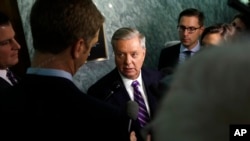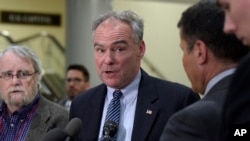Debate is intensifying in Washington on the merits and potential pitfalls, the risks and possible rewards, of the United States possibly pulling out of the international nuclear accord with Iran.
The U.S. Congress has decisions to make now that President Donald Trump has withheld certifying Iran’s compliance with the pact co-negotiated by the Obama administration.
As a candidate and as president, Trump has consistently bashed the nuclear accord with Tehran as “one of the worst and most one-sided transactions the United States has ever entered into.”
The pact halted much of Iran’s nuclear activities, but left a multitude of other thorny topics unaddressed, from Tehran’s ballistic missile program to its support for international terrorism.
U.S. Ambassador to the U.N. Nikki Haley says a new approach is needed.
“The United States has now embarked on a course that attempts to address all aspects of Iran’s destructive conduct, not just one aspect. It’s critical that the international community do the same,” Haley said.
Some on Capitol Hill applaud the move. Among those agreeing the president is Republican Senator Lindsey Graham.
“I think it was one of the worst deals I have ever seen, and President Trump has every right to change it or tear it up,” Graham said.
America’s closest allies are urging caution. Speaking Friday at the Center for Strategic and International studies in Washington, French Armed Forces Minister Florence Parly said she saw no alternative.
"We need the JCPOA,” she said, referring to the Iran deal by its formal name – the Joint Comprehensive Plan of Action. “Scrapping it would be a gift to Iran's hardliners and a first step towards future wars.”
That argument is echoed by prominent Democrats in Congress. Among the deal’s supporters is Senator Tim Kaine.
“If you weaken diplomacy, you raise the risk of unnecessary war, and that’s what this president is doing.… If we take a step back from the deal, Iran will take a step back. And what will they ask for, that they get to now increase centrifuges or get some of their enriched uranium back? I do not want to give Iran one thing back from this deal,” said Kaine.
Iran says it is adhering to the nuclear pact, at least for now. But that is not good enough for some Republicans.
“Under the deal, after the passage of 15 years, the Iranians can enrich and reprocess [uranium], no matter how they are behaving,” Senator Graham said.
Defenders of the accord note that Congress already provided tools to punish Tehran for behavior not covered by the nuclear accord.
“We have given the power to the president to impose more sanctions on Iran for bellicose behavior, for activities in other countries, for violations of human rights, for violating U.N. Security Council resolutions on their missile program,” Senator Kaine said. “The president should use the sanctions power we just gave him.”
Under former president Barack Obama, the United States committed to the nuclear accord as an executive agreement that can be revoked, not as a formal treaty binding future administrations. For many Republicans, pulling out would be an appropriate use of President Trump’s authority. According to many Democrats, it would be a dangerous mistake.








